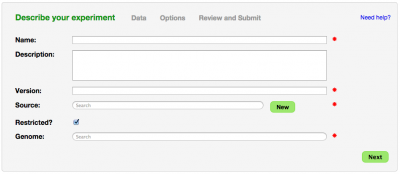LoadExperiment: Difference between revisions
No edit summary |
|||
| Line 26: | Line 26: | ||
*Your computer (Upload)<br> | *Your computer (Upload)<br> | ||
=== Data Formats | === Data Formats and Track Types === | ||
LoadExperiment supports several data file formats depending on the data type: | LoadExperiment supports several data file formats depending on the data type: | ||
Revision as of 18:41, 1 April 2014
LoadExperiment enables you to load a set of experimental quantitative, polymorphism, or alignment data for a genome in CoGe. Several different file formats are supported. The data can then be viewed alongside annotation in GenomeView.

Inputs
Metadata
- Name: Name of experiment
- Description: Description of experiment
- Version: Version of experiment
- Source: Where is the data from? This could be you, your lab, your university, a sequencing center, your collaborator.
- Restricted: Is this experiment public or restricted to you and your collaborators
- Genome: Select the appropriate genome from CoGe
- Select Data File: Opens a window for specifying the input data file
- Note: Additional metadata about the experiment can be added as well.
- Example from an experiment loaded into EPIC-CoGe: http://genomevolution.org/CoGe/ExperimentView.pl?eid=193
- Information on providing a metadata file for bulk import: Experiment Metadata
Data File
You can select and retrieve data file located at:
- The iPlant Data Store
- An FTP server
- Your computer (Upload)
Data Formats and Track Types
LoadExperiment supports several data file formats depending on the data type:
- Quantitative data
- Comma-separated (CSV) file format
- Tab-separated (TSV) file format
- BED file format
- Marker data
- GFF/GTF file format
- Polymorphism (SNP) data
- Variant Call Format (VCF) file format
- Alignment data
- BAM file format
Each of these file formats are described below in their own section. The file type can be auto-detected by LoadExperiment if the file name ends with the expected extension (.csv, .tsv, .bed, .gff, .gtf, .vcf, .bam). Files can be compressed (.zip, .gz) and still have their type auto-detected (e.g., mydata.bed.gz). For non-standard file name extensions, you can select the file type from a list.
CSV File Format
This is a comma-delimited file that contains the following columns
- Chromosome (string)
- Start position (integer)
- Stop position (integer)
- Chromosome Strand (1 or -1)
- Measurement Value must be between [1-0] (real number; inclusive)
- Second Value (OPTIONAL): can store a second value such as an expect value (real number)
#CHR,START,STOP,STRAND,VALUE1(0-1),VALUE2(ANY-ANY) Chr1,11486,12316,1,0.181430277220112,7.3980806218146 Chr1,27309,28272,1,0.944373742485446,5.08225285439412 Chr1,32484,32978,1,0.328500324191726,1.97719838086201 Chr1,41942,42508,-1,0.825027233105203,6.56057592312617 Chr1,56394,57527,-1,0.183234367788511,0.795527328556531 Chr1,67705,68809,-1,0.956523086778851,5.20992343466606 Chr1,71144,72409,1,0.42955128220331,1.80604269639474 Chr1,81671,82833,1,0.626003507696723,2.77834108023821 Chr1,86467,87623,-1,0.0878653961575928,7.42843749315945
TSV File Format
Same as CSV format but with tab delimiters instead of commas.
BED File Format
Standard BED format as defined here: http://genome.ucsc.edu/FAQ/FAQformat.html#format1
Only the first six columns are used, with the "name" field ignored.
GFF File Format
Standard GFF3 format as defined here: http://gmod.org/wiki/GFF3
Only the seqid, start, end, score, strand, and attribute columns are used (column numbers 1, 4, 5, 6, 7, 9 respectively).
VCF File Format
Standard VCF 4.1 format as defined here: http://www.1000genomes.org/wiki/Analysis/Variant%20Call%20Format/vcf-variant-call-format-version-41
BAM File Format
Standard BAM format.
Bulk Loading
Please contact the CoGe Team if you have many experiments you wish to load. We will help you with the bulk loading.